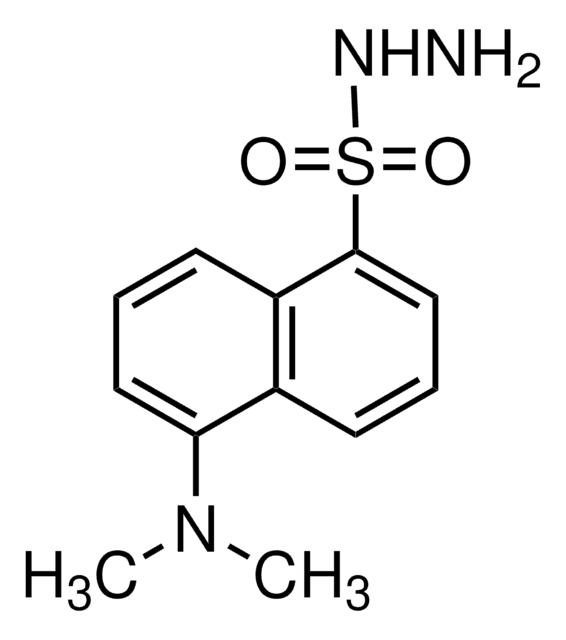82669
1-Pyrenebutyric hydrazide
for fluorescence, ≥97.0% (T)
Synonym(s):
4-(1-Pyrenyl)butyric hydrazide
About This Item
Recommended Products
grade
for fluorescence
Quality Level
Assay
≥97.0% (T)
form
solid
mp
167-171 °C
SMILES string
NNC(=O)CCCc1ccc2ccc3cccc4ccc1c2c34
InChI
1S/C20H18N2O/c21-22-18(23)6-2-3-13-7-8-16-10-9-14-4-1-5-15-11-12-17(13)20(16)19(14)15/h1,4-5,7-12H,2-3,6,21H2,(H,22,23)
InChI key
SOPPDVMSOKMZOC-UHFFFAOYSA-N
General description
Application
- Determination of succinylacetone (SA) in urine samples of hepatorenal tyrosinemia patients using high-pressure liquid chromatography with fluorescence detection (HPLC-FLD).
- Determination of glutaric and 3-hydroxyglutaric acids in urine of glutaric acidemia type I patients using HPLC technique with intramolecular excimer-forming fluorescence derivatization.
Other Notes
Signal Word
Warning
Hazard Statements
Precautionary Statements
Hazard Classifications
Acute Tox. 4 Dermal - Acute Tox. 4 Inhalation - Acute Tox. 4 Oral - Eye Irrit. 2 - Skin Irrit. 2 - STOT SE 3
Target Organs
Respiratory system
Storage Class Code
13 - Non Combustible Solids
WGK
WGK 3
Flash Point(F)
Not applicable
Flash Point(C)
Not applicable
Personal Protective Equipment
Certificates of Analysis (COA)
Search for Certificates of Analysis (COA) by entering the products Lot/Batch Number. Lot and Batch Numbers can be found on a product’s label following the words ‘Lot’ or ‘Batch’.
Already Own This Product?
Find documentation for the products that you have recently purchased in the Document Library.
Customers Also Viewed
Our team of scientists has experience in all areas of research including Life Science, Material Science, Chemical Synthesis, Chromatography, Analytical and many others.
Contact Technical Service














